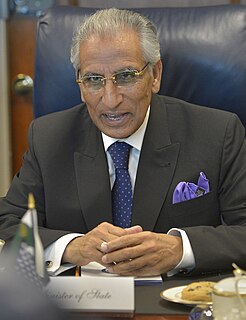Related Research Articles

Ghulam Ishaq Khan, was a Pakistani bureaucrat who served as the seventh President of Pakistan, elected in 1988 until his resignation in 1993. He was the founder of his namesake Ghulam Ishaq Khan Institute.

Sahibzada Mohammad Ali Bogra (Bengali: মোহাম্মদ আলী বগুড়া);, also sometimes known as Mohammad Ali of Bogra, was a Bengali politician, statesman, and a career diplomat who served as third Prime Minister of Pakistan, appointed in this capacity in 1953 until he stepped down in 1955 in favor of Finance Minister Muhammad Ali.

Agha Hilaly was one of Pakistan's senior most diplomats who held several high offices in the Government of Pakistan, including Pakistan's Ambassador to the United States from 21 October 1966 to 20 October 1971.

Gopalaswami Parthasarathy, popularly known as G. Parthasarathy is an Indian diplomat and author. He was Ambassador of India to Myanmar, 1992–95, High Commissioner of India to Australia (1995–98), High Commissioner of India to Pakistan (1998-2000) and High Commissioner of India, Cyprus (1990–92). Later he was the spokesperson of the Ministry of External Affairs and the Prime Minister's Office.

Agha Shahi, NI, was a Pakistani career Foreign service officer who was the leading civilian figure in the military government of former President General Zia-ul-Haq from 1977 to 1982. A diplomat and technocrat by profession, he joined Foreign Services in 1951 and held important diplomatic assignments in the United States, China, and the United Nations. He served as the Foreign secretary— the leading bureaucratic position in Pakistan Government— in 1973 until 1977, after Zulfikar Ali Bhutto's government was dismissed.

James William Spain was in the US Foreign Service with postings in Karachi, Islamabad, Istanbul, Ankara, Dar Es Salaam, and Colombo and four ambassadorships in Tanzania, Turkey, the United Nations, and Sri Lanka.

Naseer Ahmad Faruqui OBE, SPk, HQA was a prominent civil servant of Pakistan and prior to that in British India.

Abdul Sattar, was a Pakistani political scientist, career foreign service officer, diplomat, author of foreign policy, and nuclear strategist.
Ahmed Hussain A. Kazi Tamgha-e-Pakistan Award was a civil servant of Pakistan and senior advocate of the Pakistan Supreme Court, who shaped the internal revenue, economic and industrialization policies during the 1970s.
Lieutenant-General Zahid Ali AkbarHI(M), SBt, PE, was an engineering officer in the Pakistan Army Corps of Engineers, who oversaw the civil construction of the Army GHQ in Rawalpindi, and later directing the Engineering Research Laboratories (ERL), a top secret research facility developing the clandestine atomic bomb program in the 1970s. Promoted to the rank of Major General and later Lieutenant General by President Zia ul Haq, post-retirement he was targeted for political reasons by General Pervez Musharraf and forced to make a 200 million plea bargain in a corruption case in 2015 to avoid continued political persecution.

The Pakistan Administrative Service, or PAS is the most elite and prestigious cadre of the Civil Service of Pakistan. The Pakistan Administrative Service over the years has emerged as the most consolidated and developed civil institution, with the PAS officers of Grade 22 often seen as stronger than the federal government ministers. The service of PAS is very versatile in nature and officers are assigned to different departments all across Pakistan during the course of their careers. Almost all of the country's highest-profile positions such as the Federal Secretaries, the provincial Chief Secretaries, and chairmen of top-heavy organizations like the National Highway Authority, Trading Corporation of Pakistan and State Life Insurance Corporation usually belong to the elite Pakistan Administrative Service.

Justice Mushtak Ali Kazi, was a Pakistani jurist and writer, who served as a Judge of the High Court of Sindh and Balochistan.
Syed Murad Ahmed Khairi was a career Pakistani diplomat and Foreign Service officer who rose to the rank of Ambassador, with a career as Ambassador to UAE, Brazil, Nigeria and Canada. Syed Murad Ahmed Khairi retired as Pakistan High Commissioner to Canada (1989–1991).

Arshad Sami Khan ; was a Pakistani diplomat, civil servant and fighter pilot who at peak of his career attained the highest rank of Federal Secretary. He started his career as a Pakistan Air Force fighter pilot and later served 3 Presidents of Pakistan as their aide-de-camp (ADC) and later went on to the Ministry of Foreign Affairs where he served three Presidents and four Prime Ministers as chief of protocol. He was later appointed as a diplomatic ambassador of Pakistan to 14 countries. This was followed by his appointment as the first Commissioner General of Pakistan. He was also Federal Secretary of Culture and retired as a top BPS-22 grade bureaucratic officer. He was also the father of singer and music composer Adnan Sami.

The Fatwa Girl is a 2011 novel by Pakistani author Akbar Agha. It is story of love and innocence lost in the Pakistan of today, where modernity is symbolized by the possession of a nuclear bomb, but where religious hatreds are as old as time itself.
Kewal Singh (1915–1991) was an Indian diplomat, Foreign Secretary and India's ambassador to the USSR, Pakistan and USA. He was a 1955 recipient of the Indian civilian honour of Padma Shri.

Syed Tariq Fatemi(Urdu: طارق فاطمى ; born 9 July 1944), is a Pakistani diplomat who served as the Special Assistant on Foreign Affairs to the Prime Minister. He previously served as Pakistan Ambassador to the United States and to the European Union.
Tabarak Husain was a former Bangladeshi career diplomat. He was foreign secretary of Bangladesh from 1975 to 1978. He also held the position of chairman of Sadharan Bima Corporation and Grameen Bank.
Agha Shaukat Ali (1919–2013) was a civil servant turned politician in the princely state of Jammu and Kashmir, British Indian Empire. He served as the General Secretary of the Muslim Conference party in the years preceding the Partition of India. Having migrated to Pakistan after the partition, he served as a Pakistani civil servant, writer and diplomat.
References
- ↑ GoodReads: The Fatwa Girl, Hachette India